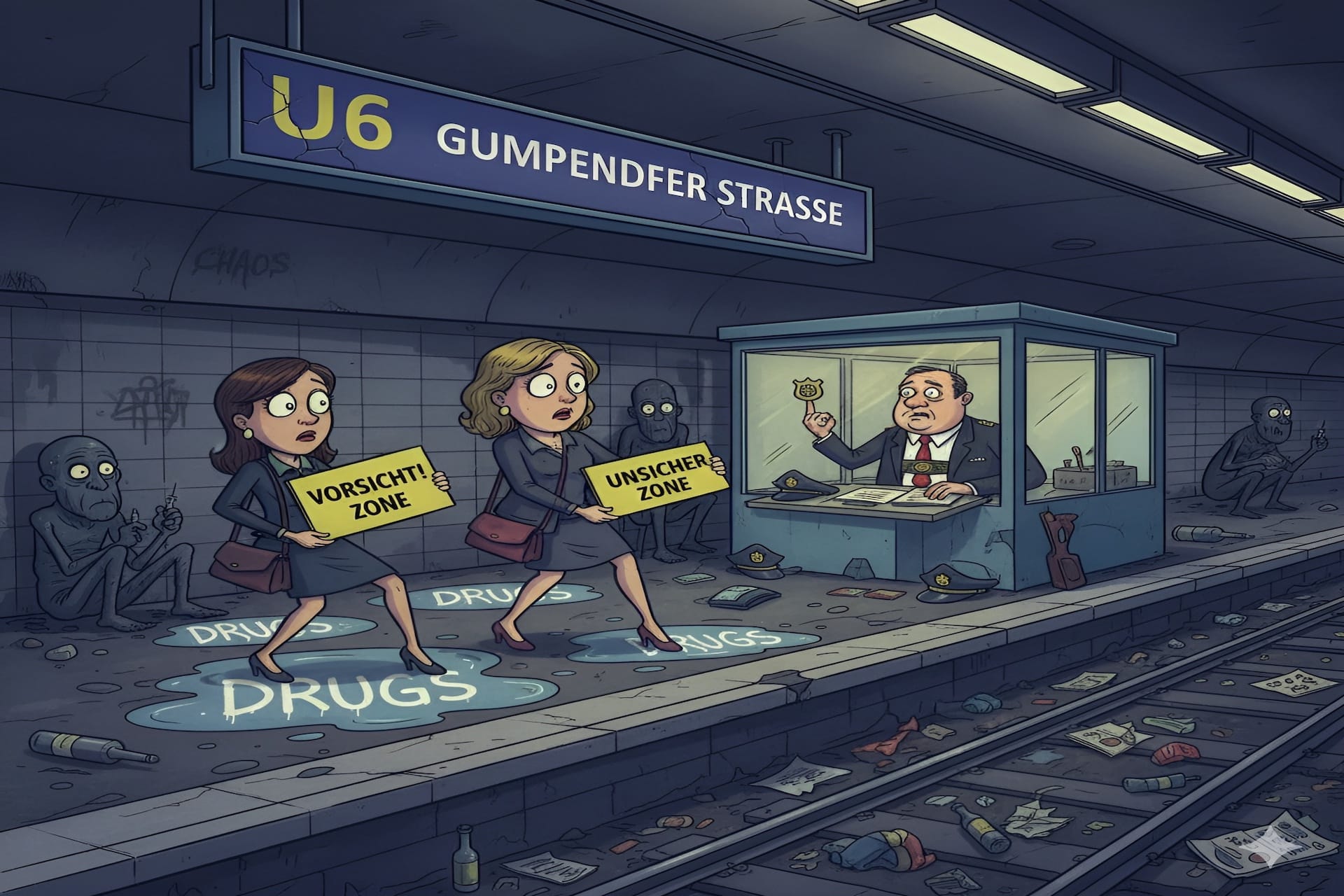U6 Metro Station Gumpendorfer Street in Vienna: A Drug Swamp and a Hell for Women
U6 Gumpendorfer Street in Vienna has become a drug swamp and unsafe zone, especially for women. The crisis highlights police shortages, wage gaps, and Austria’s distorted priorities.
AlpeAnony

Vienna is often praised as one of the safest and most livable cities in the world. Yet the situation around U6 Metro Station Gumpendorfer Straße paints a very different picture. For years, local newspapers and citizen reports have described it as a hotspot for drug abuse, insecurity, and crime, with women in particular feeling unsafe during early mornings and nighttime hours.
Empty syringes on the ground, bloodstains on the pavement, addicts injecting themselves in public parks, and a constant sense of fear — these are the realities that neighbors and commuters face daily. Despite repeated promises from city authorities and additional police patrols, the crisis persists.
This article explores not only the specific problems around the U6 metro station but also the broader challenges of crime, addiction, and public safety in Vienna, along with the deeper issues of low police staffing, wage inequality, and the lack of political accountability.
The Drug Crisis at U6 Gumpendorfer Straße
The area around U6 Gumpendorfer has become notorious in recent years:
- Open drug consumption: Addicts take substances in nearby parks, streets, and even in front of families and children.
- Public health hazards: Needles and blood stains on sidewalks create dangers for passersby.
- Unsafe environment for women: Women commuters report harassment and fear when using the metro, especially late at night.
Adding to the problem is the proximity of an addiction treatment facility, which concentrates vulnerable people in the same neighborhood. While treatment is essential, without strict supervision, these facilities can contribute to a clustering of drug use in the surrounding streets.
Police Shortages and Security Failures
The Vienna police force is short by about 1,500 officers, according to 2024 figures. Despite small-scale measures — like the 14 checkpoints established in 2025 — the lack of personnel makes it impossible to secure problematic areas like U6 Gumpendorfer around the clock.
Austrian newspapers repeatedly highlight that this shortage not only undermines public safety but also worsens working conditions for existing officers. Burnout, overwork, and constant negative publicity make police work unattractive for younger generations.
The public’s frustration is growing: why does Vienna still struggle to recruit enough officers when security is such a fundamental need?
A Question of Salaries: Politicians vs. Essential Professions
The salary gap between politicians and essential professions is striking:
- Vienna’s Mayor Michael Ludwig (SPÖ) earns €22,656.80 per month.
- Police officers earn between €2,700 and €4,000 per month.
- Nurses and caregivers also earn modest wages compared to the responsibilities they carry.
This imbalance raises pressing questions:
- How can Austria expect young people to choose careers in law enforcement, healthcare, or elderly care when these jobs offer low pay and high stress?
- Is it fair that political and administrative officials, often criticized for inefficiency, earn salaries up to eight times higher than those on the frontlines of public safety and health?
The crisis at U6 Gumpendorfer is not just about drugs. It is a symptom of Austria’s distorted priorities: undervaluing essential workers while overpaying those who fail to protect citizens.
Public Opinion and Distrust in Authorities
Citizens are losing trust in political leaders and municipal officials. Despite repeated announcements about street clean-ups, security patrols, and “special actions,” the reality for residents has not changed.
This distrust is intensified by the sense that:
- Authorities are more concerned with public relations than results.
- Short-term measures like cleaning streets or adding checkpoints do not solve the systemic problems.
- Long-term investment in staffing, salaries, and treatment infrastructure is missing.
Broader Implications: Security, Health, and Society
The problems at U6 Gumpendorfer reflect broader crises in Vienna:
- Rising crime and theft: Cafés, shops, and even clothing donation containers across Vienna have been targeted in increasing numbers.
- Drug epidemic: Public drug use is spreading to multiple neighborhoods, not just Gumpendorfer Straße.
- Declining trust: Citizens feel abandoned by institutions, from the police to political leadership.
The connection is clear: when the state underpays essential professions and fails to provide adequate services, public security and social cohesion suffer.
My Perspective: A Warning for Vienna’s Future
From my point of view as an Austrian citizen, the U6 Gumpendorfer crisis is a warning sign of deeper decay. Vienna risks losing its reputation as a safe, livable city unless bold steps are taken:
- Raise salaries and improve conditions for police, nurses, and caregivers to attract young talent.
- Invest in long-term solutions — addiction treatment, housing, employment programs — rather than superficial clean-ups.
- Hold political leaders accountable for ensuring that taxpayers’ money goes to protecting citizens, not just financing oversized salaries for officials.
If Vienna continues on its current path, we may face a city where fear replaces safety, and where essential services collapse under the weight of neglect.
Conclusion: Will Vienna Listen Before It’s Too Late?
The public asks a simple but powerful question: when crime rises, when security declines, when healthcare and care services are collapsing — why are essential professions underpaid while politicians prosper?
The case of U6 Gumpendorfer is not isolated. It is a symbol of Austria’s broader failure to balance wages, responsibilities, and public needs.
Vienna has a choice: continue ignoring the warnings or take meaningful action to protect its people. The answer will define whether the Austrian capital remains a model of safety or becomes a cautionary tale of neglect.
